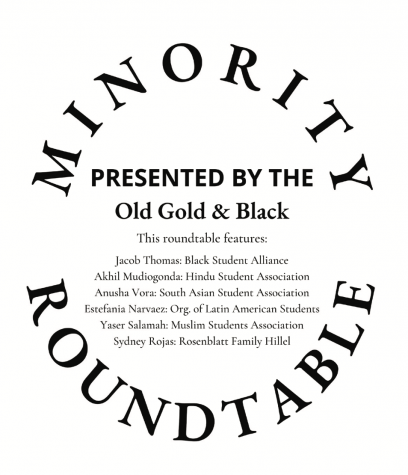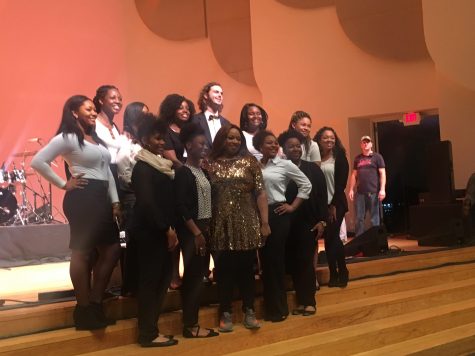To Rush Or Not To Rush?
August 19, 2021
Pro-Greek
RUSH: At many schools across the country, college freshmen and sophomores are diving head first into the intimidating Greek life process. Young men and women go through various experiences, good and bad, in hopes of getting a bid from their favorite fraternity or sorority.
Everyone’s heard the stories of intimidating girls chanting Greek letters on a loop or boys pressuring their pledges to do ridiculous or downright dehumanizing tasks. Many college students decide the rush process and entire concept of Greek life is not for them.
I fully understand those students who do not believe joining a frat or sorority would be beneficial to their college experience, but, I know that for many people, Greek life is what makes their college years so special.
Wake Forest is an amazing university on its own, as it gives students the opportunity to explore many different academic paths, extracurricular activities and social experiences. The university’s incorporation of Greek culture is just one of these wonderful opportunities. Due to the structure, Wake Forest freshmen are allowed an entire semester of familiarizing themselves with the campus and creating new friendships before they even have to decide whether or not to rush in January. Though the majority of students at Wake Forest are members of Greek organizations, the university encourages concentrations apart from Greek life by delaying the process to the winter, encouraging on campus living through junior year and offering a variety of extracurriculars that both Greek affiliated and non-Greek affiliated students take part in.
Why do so many students choose to rush? I cannot speak for every girl in a sorority (and certainly not for young men in fraternities), but having a built-in support system is one of the biggest advantages of being a member of Greek life. Coming from an all-girls school, which I spent 10 years at, I knew that I wanted to be a member of a sorority for the same reason I felt so comfortable and had so much love for my school: sisterhood. I believe that the all-girl environment allows the members to be their truest selves and bond with each other.
Though the rush process was emotionally taxing and difficult at times, it works quite well. Not everyone in each sorority is the same, but the sororities do a fantastic job at recruiting girls who would fit into their culture the most comfortably. Immediately after rush week, which most students can agree is not easy, the new pledge class is welcomed with excitement and full support. There is a true sense of pride knowing that you were wanted in such an amazing group of people.
During the second semester of my freshman year, I felt much more integrated into the Wake Forest community. I was not just a floater, but instead a member of a group. I made strong connections with many of the other girls in my pledge class. The majority of us had all finished rush with the same goal: to meet as many other girls in our sorority as possible and create strong friendships. It was only then that I realized how successful the rush process is at recruiting members to the proper organizations. I met several girls with lots of similarities and were incredibly easy to connect with.
I’ve only truly been a member of my sorority for one semester on campus, but I’m already so grateful that I chose to rush and picked (and was picked by) the right sorority. I’ll reiterate that rush and Greek life aren’t for everyone, but in my experience, much more good comes from stepping out of your comfort zone and keeping an open mind.
Pro-GDI
As a first year student at Wake, hearing the statistics about 50% of students participating in Greek life on campus can be overwhelming and misleading. Online forums will tell you it’s impossible to escape sororities and fraternities in the social scene and while interaction with the Greek community is inevitable, rushing does not have to define your Wake Forest experience.
One of the main motivators for going Greek is finding friends in the sea of freshmen who you may or may not have anything in common with, and narrowing down commonalities can be daunting. The rush process narrows it down somewhat, but there are a number of less taxing alternatives to consider first. During your first semester (and beyond), exploring different groups that align with your interests can introduce you to new friends. Finding your community is important whether or not you decide to rush, so take advantage of the involvement fair and club recruitment as much as possible.
The first friends I made on campus were through my a cappella group, and others I found taking photos for the yearbook and working for the OGB. Although I’m no longer close with my freshman hall, living in a residential engagement community my sophomore year presented a lot of opportunities to network and meet new people. I know a lot of individuals who found their people volunteering for local community service projects such as Campus Kitchen, playing intramural sports, pursuing campus ministry or joining clubs that center around their identity like BSA, MSA and more. You can also make friends by attending campus events such as the Wayward Fashion Show or plays put on by the Theatre department and AAP.
Another reason people rush is for the networking opportunities, but Wake Forest provides a range of resources for career development. If you’re rush-hesitant but still want connections, I would encourage you to check out the OPCD and classes led by experts like Professor Heidi Robinson through the College to Career series in the Education department.
Although I never had an interest in Greek life, I didn’t want to rush for three main reasons. First, it can be an expensive financial investment to be in a sorority or fraternity, from dues to fines to ‘optional’ additions to your wardrobe, money is an important factor to consider. Second, it’s a big investment of your time to attend chapter meetings, date functions, philanthropy events and recruitment workshops. The phrase, “I’m only here so I don’t get fined,” extends beyond pro sports to mandatory social events. Finally, conforming to the demands of standards boards sounds exhausting, from the constant monitoring of social media accounts to specific rules about letters and secret rituals. It’s just not my cup of tea.
Greek life does not have to be a negative experience — if it were, I’m sure over 50% of campus wouldn’t pay semesterly dues for a few date functions and multi-colored Chuck Taylors. This said, my college experience has been phenomenal without Greek life and I know a lot of girls who ended up disaffiliating from their chapters due to frustration with monetary commitments, fellow members and a variety of other reasons.
There are a number of other problematic practices I won’t get into, but one girl’s trash is another girl’s treasure. Do your research, follow your gut and things will work out the way they are meant to. If that means you will find your place in Greek life, cool. If it means you will find your way without Greek life, even better! (In my humble, slightly biased opinion, that is).
























